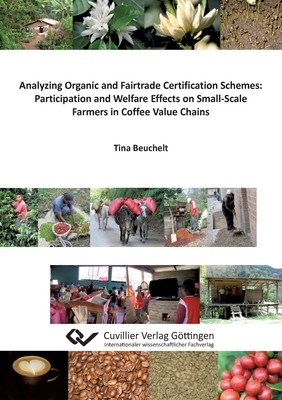
- We will send in 10–14 business days.
- Author: Tina Beuchelt
- Publisher: Cuvillier
- ISBN-10: 3954041197
- ISBN-13: 9783954041190
- Format: 14.8 x 21 x 1.2 cm, softcover
- Language: English
- SAVE -10% with code: EXTRA
Analyzing Organic and Fairtrade Certification Schemes (e-book) (used book) | bookbook.eu
Reviews
Description
Organic and Fairtrade certified coffees have become very popular among socially, environmentally and health conscious consumers in recent years. As consumers pay higher prices for these certified coffees, it is commonly assumed that, compared to conventional coffee, better producer prices are paid and that higher shares of the added value in consuming countries trickle down to the producers. Coffee certifications are thus supposed to benefit the coffee producers. Coffee is an important export good for many developing countries. The majority of global coffee production comes from around 20-25 million smallholder families in developing countries. As individual certifications are too expensive smallholders have to participate in farmer organizations, e.g. cooperatives, in order to access cheaper group certification. Governments and international donors support coffee certification schemes and assume that these link farmers to high-value markets, increase producers' incomes, change power and information asymmetries in value chains, and contribute to poverty reduction. Yet, there is only weak empirical evidence that justifies this support. There are few quantitative studies which applied random sampling techniques, and analyzed the effects of certification schemes in regard of gross margins, profits, income shares and poverty levels of certified smallholder coffee producers. The role of cooperatives for the success of certification schemes has been neglected by research. The available studies have methodological limitations, for example they are based on qualitative methods only, include no more than one cooperative or one certification standard, or cooperatives are non-randomly sampled. This research seeks to fill the identified knowledge and methodological gaps. Through a combination of qualitative and quantitative research, the production and marketing strategies of small-scale coffee producers in northern Nicaragua are compared based on producers that are organized
EXTRA 10 % discount with code: EXTRA
The promotion ends in 21d.00:41:26
The discount code is valid when purchasing from 10 €. Discounts do not stack.
- Author: Tina Beuchelt
- Publisher: Cuvillier
- ISBN-10: 3954041197
- ISBN-13: 9783954041190
- Format: 14.8 x 21 x 1.2 cm, softcover
- Language: English English
Organic and Fairtrade certified coffees have become very popular among socially, environmentally and health conscious consumers in recent years. As consumers pay higher prices for these certified coffees, it is commonly assumed that, compared to conventional coffee, better producer prices are paid and that higher shares of the added value in consuming countries trickle down to the producers. Coffee certifications are thus supposed to benefit the coffee producers. Coffee is an important export good for many developing countries. The majority of global coffee production comes from around 20-25 million smallholder families in developing countries. As individual certifications are too expensive smallholders have to participate in farmer organizations, e.g. cooperatives, in order to access cheaper group certification. Governments and international donors support coffee certification schemes and assume that these link farmers to high-value markets, increase producers' incomes, change power and information asymmetries in value chains, and contribute to poverty reduction. Yet, there is only weak empirical evidence that justifies this support. There are few quantitative studies which applied random sampling techniques, and analyzed the effects of certification schemes in regard of gross margins, profits, income shares and poverty levels of certified smallholder coffee producers. The role of cooperatives for the success of certification schemes has been neglected by research. The available studies have methodological limitations, for example they are based on qualitative methods only, include no more than one cooperative or one certification standard, or cooperatives are non-randomly sampled. This research seeks to fill the identified knowledge and methodological gaps. Through a combination of qualitative and quantitative research, the production and marketing strategies of small-scale coffee producers in northern Nicaragua are compared based on producers that are organized


Reviews